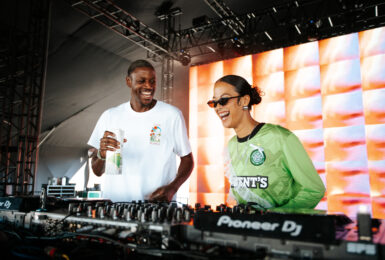
Music
video premiere: saul williams is back on “experiment”
Saul Williams sees the future so well because he is keenly aware of the past. The man who brought us genre-bending explorations of identity and society with projects like his debut album, Amethyst Rock Star, and 2016’s MartyrLoserKing, has returned with “Experiment,” the first single from his self-produced upcoming album Encrypted & Vulnerable (July 18 on Pirates Blend).
Encrypted & Vulnerable is the second installment of a trilogy that follows a coltan miner-turned-hacker living in Burundi using the screen name, “MartyLoserKing” who becomes an international sensation à la Bansky, but winds up being labeled a terrorist by the powers that be. The new album features contributions from TV On The Radio’s Dave Sitek, Christian Scott aTunde Adjuah, King Britt, Orko Eloheim, Thavius Beck, CX KiDTRONiK, and others, like-minded thinkers and musicians. The album will also serve as the score to Williams’s upcoming debut musical, Neptune Frost, executive produced by Lin Manuel Miranda.
The Christian Stephen-directed video for “Experiment” uses Google VR 360 technology to present Williams, adorned in jewelry fashioned from a computer motherboard, as a being at the nexus of primitive and futuristic.
AFROPUNK spoke with Williams to learn about the new project, his creative process, and the precarious relationship between tech and humanity.
You went from being known as a poet to being known as a musician, it’s been a long time since then, why are you calling this your “first spoken word album?”
I’ve dodged and avoided labels for a long time. I felt I had no real autonomy in how to classify my work. When I finished my first album, the label at the time [American Recordings] refused to release it because they were expecting a hip-hop album and argued that Amethyst Rock Star was not. My argument then was that it was too early for some executives in an office to be deciding what was hip-hop or not, the genre itself was too young and in the midst of defining itself. From there, I pushed forward into my self-titled album where I played and sampled punk loops in defiance of the idea of genre and came up with my own classification “Grippo,” as the goal-post of the weird sound I worked to master. Cut to the present moment; where in many instances it feels like the most forward-thinking approach to some of the sounds I’m producing is to just talk over them. I grew up to preachers talking over piano’s and humming choirs, to George Clinton talking over bass-lines and funk-breaks, Fela talking over horn and rhythm sections, Jim Morrison talking over keyboards and synths…and the evolution of my sound and stylings have come full circle.
The mythos behind the MartyrLoserKing trilogy exists at the intersection of technology and geopolitics, what role do you think technology plays in the struggle of oppressed and marginalized people?
We are the technology. I was recently moved by a book called “The Sound of Culture: Diaspora and Black Technopoetics” by Louis Chude-Sokei. The book covers a lot of ground but one of the standouts for me is thinking of the plantation as a machine and the way in which the colonial mentality is embedded in machines. For example, if you ask an engineer to take apart an engine for anything from a camera, recording device, to car, computer, or spaceship they will describe parts of the engine in terms of “master” and “slave”. Recording artists have played with the pun for a while now when they talk or rap about owning their masters. Look up the two-reel recording device or any device and see the terms inscribed. The industrial era, the era of machines and factories, came out of the colonial era. The innovators of that era literally used colonial terms in the making of the machines that exist till this day, The word “robot” comes from the Czech language and means “free labor” or “slave”. The irony is in the fact that the fear of the colonial era was that the slave would learn too much and seek revenge or take over so they restricted reading, learning, etc. The fear of the virtual age is now that the robots or AI will learn too much and take over. It’s the same fear. And the same exploitation that is kept out of our [social media] timelines but that technology is dependent on rare minerals and resources are still sourced on the continent of Africa and mined by marginalized groups worldwide. It’s the history of the free market and capitalism- the exploitation of the worker and region from cotton, to rubber, to sugar, to coffee, to chocolate, to oil, to uranium, to diamonds, to gold, to coltan… So yes, technology plays a big role because of its dependency. Real technology would transform that dependency into something that transforms the system. But the system has yet to be transformed, and we are the machines.
What or who is the experiment that the title of this song refers to?
I am. Henrietta Lacks is. Democracy is. Success is. Social media is. Criminal justice is. Resistance is. Music is…
Tell us about your creative process when it comes to music. Do you approach albums as album-length projects—or do you just write-write-write and when you have a critical mass of work ready to be put to music, you start thinking about it that way?
In most recent cases I’ve approached albums conceptually. With Encrypted & Vulnerable I started with a very strong idea of wanting to make an album with strong rhythms and no beats. My creative process has a lot of “write-write-write” in it but when I’m on to something, I take note and try to start pushing newer works that direction. It’s often about self-challenges and experiments within the framework of a story. My books and albums have developed in that way.
Over the past few years, you’ve done a lot of great collaborations (David Murray, Christian Scott aTunde Adjuah, King Britt) all of whom seem to have an imprint on Encrypted & Vulnerable, how much like your previous records is this one?
Great observation. I am a student, first and foremost. My work with Rick Rubin, Trent Reznor, David Murray, Christian Scott aTunde Adjuah, King Britt, Thomas Kessler (composer of “,Said the shotgun to the head.” and NGH WHT symphonies) and on and on have all been experiences where I’ve walked away with a greater understanding of sonics, harmonics, dynamics, rhythm, cadence, etc. I seek many of these opportunities out for exactly these reasons. When I’m working with jazz or classical musicians, I am most often surrounded by virtuosity, which pushes and expands my understanding and relationship to sound, audience, composition. Yes, the influence of my studies and travels definitely shows in this album, which is why I’m so proud of it. It’s something to show and share with my teachers.
Get The Latest
Signup for the AFROPUNK newsletter




